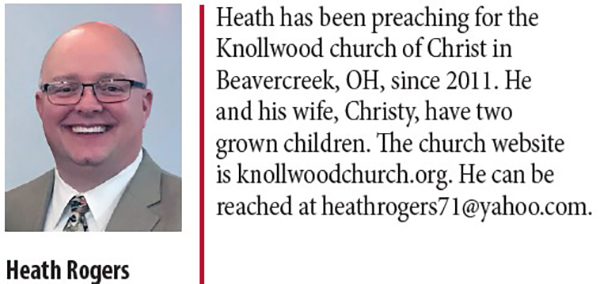by Heath Rogers
Synopsis: Some of the work attributed to the Holy Spirit by people is actually the work of their conscience and emotions.
The Holy Spirit is an avoided and misunderstood subject in the Lord’s church today. Brethren naturally have questions about the Holy Spirit. When there is a lack of teaching done on the Holy Spirit, brethren will sometimes fill this void with the errors they hear from their friends, neighbors, and television preachers. More and more, we are hearing brethren claim to be led by the Holy Spirit separate and apart from His word. This can be heard in conversations and read in blogs and exchanges on social media. They make the same statements as those in denominationalism: “The Holy Spirit spoke this to me,” or “The Holy Spirit laid this on my heart,” or “The Holy Spirit moved me.” Sometimes these claims are used to justify departures from the truth of God’s word. Thus, we can see that teaching is needed on this vital aspect of the Holy Spirit.
God has equipped man with a conscience. The conscience is defined as “a knowledge or sense of right and wrong, with a compulsion to do right; moral judgment that opposes the violation of a previously recognized ethical principle and that leads to feelings of guilt if one violates such a principle” (Webster’s Dictionary, 302).
Our conscience is our “guidance system.” It lets us know if we are doing right or wrong. For instance, when we do what we understand to be wrong, our conscience will make us feel guilty. When we do what we understand to be right, our conscience will justify us or make us feel right.
Each of us responds to our individual conscience. It is a guide, but it is only a safe guide if it has been appropriately trained. The conscience of the Christian is to be trained by the word of God. The apostle Paul said, “Do not be conformed to this world, but be transformed by the renewing of your mind, that you may prove what is that good and acceptable and perfect will of God” (Rom. 12:2). Our way of thinking is “transformed” when our minds are renewed. This is not done miraculously. Our minds are renewed as we learn God’s standards of right and wrong set forth in His word. As we learn these standards of righteousness, our conscience is trained.
The Christian must allow his conscience to be trained by the word of God and not by family traditions, personal opinions, worldly standards, or denominational doctrines. The conscience cannot be a safe guide if it has been trained by a false standard.
“Your word I have hidden in my heart, that I might not sin against You” (Ps. 119:11). If we have trained our conscience by filling our hearts with the word of God, our conscience will remind us of these Scriptures as we face challenges and make decisions throughout the day. When we see someone in need, we will feel moved to help them, not because the Holy Spirit is “laying that on our heart,” but because we know it is the right thing to do. When we contemplate making a wrong decision, we will feel a sense of guilt or disapproval regarding that decision. This is not the Holy Spirit making us feel bad. It is our conscience doing its job.
People who claim to receive miraculous guidance from the Holy Spirit often uphold doctrines and practices contrary to Scripture. When the inconsistency between their belief and the teaching of Scripture is pointed out, they will sometimes respond with statements such as, “I would rather have what I feel in my heart than what is written in a whole stack of Bibles,” or, “A person with an experience is never at the mercy of a person with an argument.” Such individuals give their feelings and experiences more merit than the word of God.
God has given man emotions. We can experience things such as love (1 Pet. 4:8), joy (Phil. 4:4), sorrow (2 Cor. 7:10), and fear (Matt. 10:28). While our emotions are important, God has also created us with the ability to reason and understand (Isa. 1:18; Eph. 5:17).
Emotion has its place in our service and worship, but we must understand its place. Emotion does not create or establish truth. It is appropriate for man to have an emotional response when he gains knowledge of the truth. The Jews on Pentecost were cut to the heart when they learned they were guilty of crucifying their Messiah (Acts 2:36-37). Felix became afraid when he heard Paul preach about righteousness, self-control, and the judgment to come (Acts 24:25). The Philippian Jailer rejoiced after he heard and obeyed the gospel (Acts 16:30-34). All of these were emotional responses.
Emotion is the proper response to knowledge, but emotion without understanding is not enough to please God. “Brethren, my heart’s desire and prayer to God for Israel is that they may be saved. For I bear them witness that they have a zeal for God, but not according to knowledge” (Rom. 10:1-2). Israel had emotion, they had zeal, but they did not have knowledge of the truth which was necessary for salvation (Hos. 4:6). Accordingly, were not saved.
Some religious people today are filled with zeal and enthusiasm, but they express little regard for the word of God. They would rather have an experience, or have the Holy Spirit lay something upon their heart, than be content to follow the words of the Bible. The Holy Spirit revealed the will of God to man. This knowledge will condemn a man of his sin in an effort to bring him unto repentance. When a man responds to the gospel in obedience, he can rejoice in the forgiveness of his sins. As he continues to abide in the doctrine of Christ, he will continue to find joy and peace. A personal and direct experience with the Holy Spirit is unnecessary for one to feel these emotions; neither are these emotional experiences evidence that one has had any experience with the Holy Spirit.
The Holy Spirit has revealed the will of God to man in words that we can understand. He influences man through the word of God. He does not speak directly to the hearts of men today. He speaks, teaches, warns, guides, etc., through the word of God.
Mankind has been created with a conscience that guides him in his life. If trained by God’s word, the conscience will warn a man when he is doing wrong and approve his actions when he is doing right. If we store up the word of God in our hearts through Bible reading, study, and meditation, it will be available to us when we need it in our daily lives. The Holy Spirit does not guide us or miraculously remind us of Scripture in our daily lives. This is the work of our conscience.
We were also created with the capacity to experience emotions. However, emotion is never the source of truth. Instead, knowledge of truth is what generates proper emotional responses. Religious emotionalism (or its more secularized cousin, spiritual mysticism)—devoid of knowledge and divorced from revealed truth is incapable of saving our souls or making us acceptable unto God.
Guralnik, David B. Webster’s New World Dictionary of the American Language, New York, NY: 1986.



